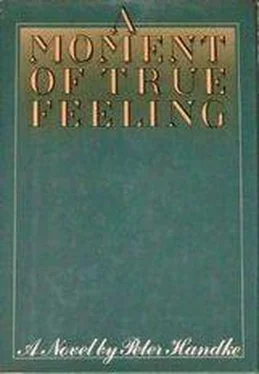Keuschnig wanted nothing more for himself. The usual sights took on a magical sparkle — and every one of them showed him inexhaustible riches. He himself had ceased to count, for he had merged with all those others who were moving this way and that with selfless energy, and he fully expected the jolt he created by transferring the happiness he had no use for to these people, to make them change their step. He was still in a certain sense alive — with them. His state was no longer a momentary mood; it was a conviction (to which all his momentary moods had contributed!), a conviction it would be possible to work with. Now the idea that had come to him on seeing those three things in the sand of the Carré Marigny seemed usable. In becoming mysterious to him, the world opened itself and could be reconquered. While crossing an overpass near the Gare de l’Est, he saw an old black umbrella lying beside the railroad tracks down below: this was no longer a pointer to something else; it was a thing in its own right, beautiful or ugly in its own right, and ugly and beautiful in common with all other things. Whichever way he looked, there was something to see, just as in dreams of finding gold one sees its glitter every time one bends down. Particulars remote from one another — a spoon yellowed by egg yolk lying in the street, the swallows high in the air — vibrated with a kinship and harmony for which he required no further memory or dream, and left him with a feeling that one could return home on foot from any point whatsoever.
The sun was already so low that the cars were dark on the dazzlingly bright boulevards. Someone was walking behind him, keeping step with him, neither catching up nor falling back — but Keuschnig didn’t look around. People were standing in line outside a movie house where Ben Hur was being shown. How long was it since he himself had seen that picture; how often since then it had been shown all over the place! Yet there were still people seeing it for the first time, people entirely different from him but at the moment quite the same. How many people were toting bundles of clothing down the street because most of the cleaning establishments closed at the end of July, while others, carrying folded air mattresses in beach bags, were going home from the swimming pools. He sat down on the terrace of a cafe; a sign fastened to the awning said: CHANGEMENT DE DIRECTION: TOUT EST BON. Out in the street, a few yards of old car track that had not been entirely tarred over glistened in the sun. An apartment was still for sale in the new building across the way. Under the café chairs two dogs were barking at each other. A very old man chuckled as he dropped an airmail letter into a mailbox …
It was only when from time to time he saw a woman pass that Keuschnig became uneasy. The lines of the calves and thighs, the clefts of their bosoms filled him with such longing that he felt his face growing stern. Once, when a woman passed behind the frosted-glass pane of a bus shelter and only her silhouette could be seen, he wished she would go on walking behind the frosted glass forever. He was overcome with rage and chagrin at the thought that all these passing women were not meant for him, that he would never see them again, and an intimation came to him of what they might have meant in his life. How it upset him — even today! — when he failed to get a good look at one of those faces — as though he were missing something crucial.
Then the sunshades were lowered, but they still revolved in their supports, for the wind had risen. The waiter smiled on receiving his tip, and today Keuschnig took that smile very seriously. He was grateful to the people who remained seated near him but paid no attention to him. For a long while he watched the water from a hydrant gush foaming into the gutter. When in a newspaper someone had left behind he read that a singer had achieved “a glorious C-major,” he was so moved he almost screamed. He wanted to leave his fingerprints all over the table. A man reading a book beside him took off his glasses, and suddenly Keuschnig was afraid he might be leaving — but the man only thrust the book into the distance and went on reading. What a relief, what peace! … Keuschnig looked around. Maybe something would come of it: a new thought, a possibility. For some time now, a game of ping-pong had been in progress in the cellar under the café, and the regular click-click-click filled Keuschnig with disgust. At last the ball went astray … Thoughtless and unafraid, he left the café and climbed the steep paths of the Buttes-Chaumont.
He passed a police call box. The deep red post was a tangible consolation in a painfully expanding wasteland, and absurdly he made a note of the spot. Someone was RUNNING behind him; no, not running on his account; someone WHISTLED, why wouldn’t he be whistling at him?! Slight incongruities outside him now affected him in his own body; he jumped at the sight of a potato rolling out of a woman’s string bag, cringed when he saw, far below, a child riding a bicycle through a puddle.
He felt cold again. Some blue shirts on a clothesline behind bushes at the edge of the park reminded him of his birthplace, not of any particular event, but of a long, mortal eventlessness. As though that were the possibility, he tried to open his mind to other memories. But nothing happened, except that he suddenly found himself outside the entrance to an underground station in wintry Stockholm … Could new gestures and faces be a way out? How about wagging his head, pursing his lips, and fanning himself with one hand like these French people? No more of that nonsense … By then he was standing on an artificial cliff and looking westward he could see Paris in the yellow evening sun. A little daydream might be his salvation! He felt his pockets to make sure he had his passport. At this point, only someone from another system could hold him back. Not far away, a wrinkled woman with hair on her chin gave a younger man a smacking kiss on the lips, and went off. Keuschnig waited, strangely curious, for the man to wipe away the alien saliva. But he only stood motionless, gazing down at the city, and after a while walked away with long strides.
At that moment Keuschnig felt ashamed of having to die and be dead. The way things had turned out, there was nothing left for him to do but draw a last breath and be a corpse. He could put up with being dead if the rest of the world would stop at the same moment. As it was, his body, in death more pretentious than ever, would only be putting on airs. He took a step forward, not for any precise purpose, but for spite, because he no longer knew what he wanted. — The hair-raisingly repugnant sense of shame he had so often experienced at the thought of living and of being something bodily, nakedly conspicuous and unique, of being ONE TOO MANY, held him back from the last and most singular manifestation of life, and made him for the present stay where he was at the top of the cliff.
Though he no longer envisaged a way out, he looked around from sheer instinct, and saw, some distance away, the fat writer, who had apparently been looking at Keuschnig for some time, for he was not out of breath from the steep climb. The writer clapped his notebook shut and put it away in the inside pocket of his jacket, as though certain he wasn’t going to need it any more. “I’ve been following you all day, Gregor,” he said. “I have tempered my idea with observations and now I’m satisfied. Incidentally, when the murderess flings herself from the tower of the Spanish church at the end of Vertigo , the sky is not blue, it’s deep-dark and clouded, in the last light of the day. ‘God have mercy on her soul,’ says the nun, and tolls the bell. Your child is at my place with Stefanie and that’s where she’ll stay for the present. I have no further use for you and wish you the best of luck.”—The writer stood there for some time, then made a face or two, perhaps to convince Keuschnig that he was real, and walked off across the grass, blindly trampling a flower bed. “You don’t know anything about me!” Keuschnig shouted after him. At that the writer only raised his arm; he didn’t turn around.
Читать дальше












